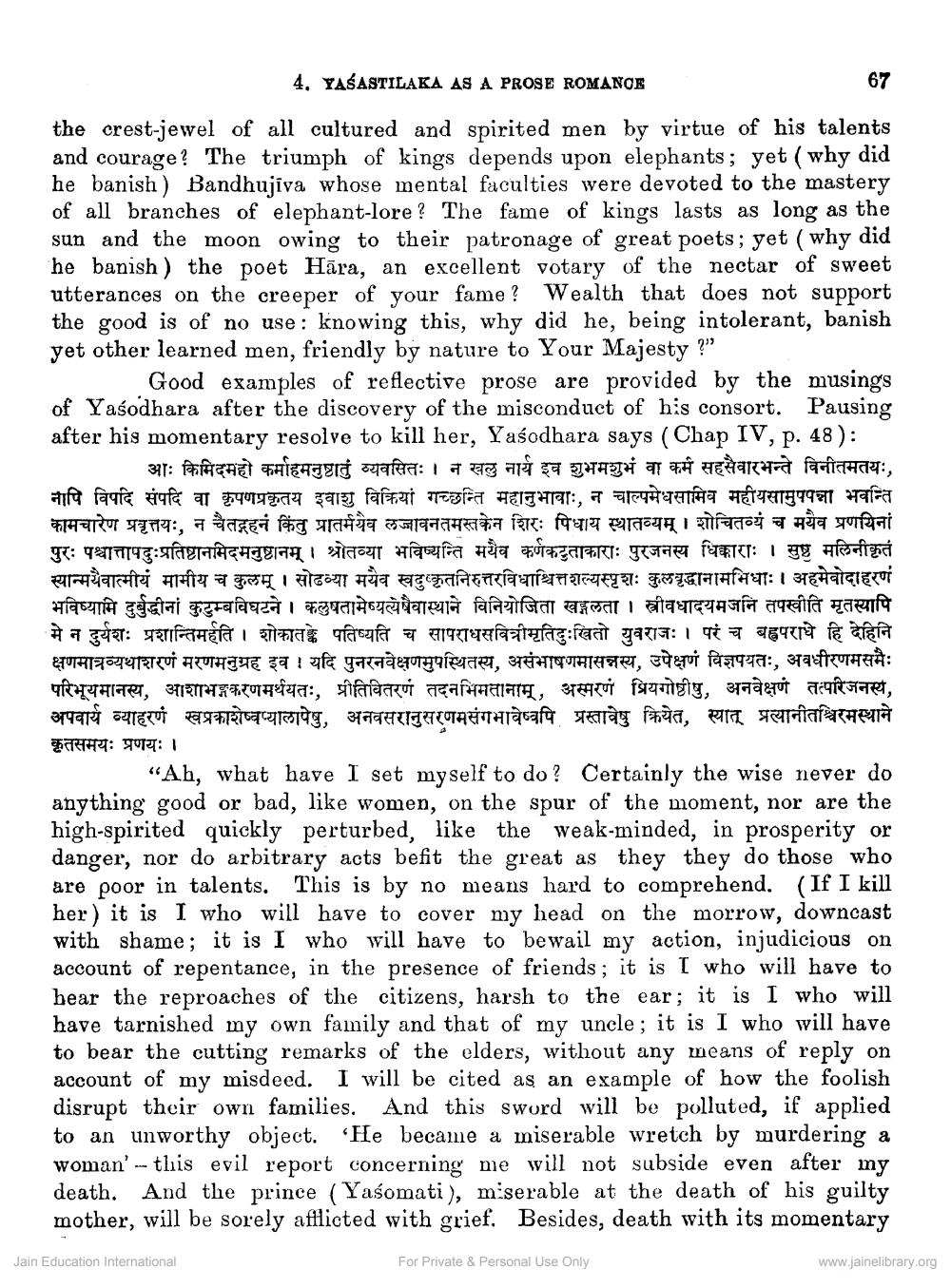________________
4. YASASTILAKA AS A PROSE ROMANCE
67
the crest-jewel of all cultured and spirited men by virtue of his talents and courage? The triumph of kings depends upon elephants; yet (why did he banish) Bandhujiva whose mental faculties were devoted to the mastery of all branches of elephant-lore? The fame of kings lasts as long as the sun and the moon owing to their patronage of great poets; yet (why did he banish) the poet Hāra, an excellent votary of the nectar of sweet utterances on the creeper of your fame? Wealth that does not support the good is of no use : knowing this, why did he, being intolerant, banish yet other learned men, friendly by nature to Your Majesty ?"
Good examples of reflective prose are provided by the musings of Yasodhara after the discovery of the misconduct of his consort. Pausing after his momentary resolve to kill her, Yasodhara says (Chap IV, p. 48 ):
आः किमिदमहो कर्माहमनुष्टातुं व्यवसितः। न खलु नार्य इव शुभमशुभं वा कर्म सहसैवारभन्ते विनीतमतयः, नापि विपदि संपदि वा कृपणप्रकृतय इवाशु विक्रियां गच्छन्ति महानुभावाः, न चाल्पमेधसामिव महीयसामुपपन्ना भवन्ति कामचारेण प्रवृत्तयः, न चैतद्गहनं किंतु प्रातर्मयैव लज्जावनतमस्तकेन शिरः पिधाय स्थातव्यम् । शोचितव्यं च मयैव प्रणयिनां पुरः पश्चात्तापदुःप्रतिष्ठानमिदमनुष्ठानम् । श्रोतव्या भविष्यन्ति मयैव कर्णकटुताकाराः पुरजनस्य धिक्काराः । सुष्ठ मलिनीकृतं स्यान्मयैवात्मीयं मामीय च कुलम् । सोढव्या मयैव स्वदुष्कृतनिरुत्तरविधाश्चित्तशल्यस्पृशः कुलवृद्धानामभिधाः । अहमेवोदाहरणं भविष्यामि दुर्बुद्धीनां कुटुम्बविघटने । कलुषतामेष्यत्येषेवास्थाने विनियोजिता खगलता । स्त्रीवधादयमजनि तपखीति मृतस्यापि मे न दुर्यशः प्रशान्तिमर्हति । शोकातङ्के पतिष्यति च सापराधसवित्रीमृतिदुःखितो युवराजः । परं च बह्वपराधे हि देहिनि क्षणमात्रव्यथाशरणं मरणमनुग्रह इव । यदि पुनरनवेक्षणमुपस्थितस्य, असंभाषणमासन्नस्य, उपेक्षणं विज्ञपयतः, अवधीरणमस परिभूयमानस्य, आशाभङ्गकरणमर्थयतः, प्रीतिवितरणं तदनभिमतानाम् , अस्मरणं प्रियगोष्ठीषु, अनवेक्षणं तत्परिजनस्य, अपवार्य व्याहरणं खप्रकाशेष्वप्यालापेषु, अनवसरानुसरणमसंगभावेष्वपि प्रस्तावेषु क्रियेत, स्यात् प्रत्यानीतश्चिरमस्थाने कृतसमयः प्रणयः ।
___“Ah, what have I set myself to do? Certainly the wise never do anything good or bad, like women, on the spur of the moment, nor are the high-spirited quickly perturbed, like the weak-minded, in prosperity or danger, nor do arbitrary acts befit the great as they they do those who are poor in talents. This is by no means hard to comprehend. (If I kill her) it is I who will have to cover my head on the morrow, downcast with shame; it is I who will have to bewail my action, injudicious on account of repentance, in the presence of friends; it is I who will have to hear the reproaches of the citizens, harsh to the ear; it is I w] have tarnished my own family and that of my uncle ; it is I who will have to bear the cutting remarks of the elders, without any means of reply on account of my misdeed. I will be cited as an example of how the foolish disrupt their own families. And this sword will be polluted, if applied to an unworthy object. “He became a miserable wretch by murdering a woman' - this evil report concerning me will not subside even after my death. And the prince (Yasomati), miserable at the death of his guilty mother, will be sorely afflicted with grief. Besides, death with its momentary
Jain Education International
For Private & Personal Use Only
www.jainelibrary.org




